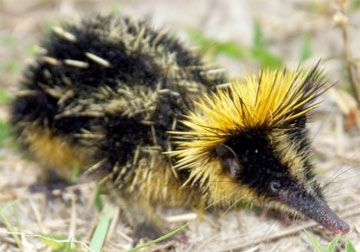|
|
A bit of hopeful conservation news has finally emerged out of the political crisis in Madagascar, report local sources.
Wednesday representatives from several NGOs active in conservation in Madagascar met with Mario Rakotovao of the Ministry of Environments, Water and Forests (Ministère de l’Environnement, des Eaux et Forets) for the island nation’s new government. The minister said his top priority was putting an end to illegal logging that emerged when rangers abandoned their posts and armed gangs moved into protected areas in the wake of the political crisis.
According to a report from a conservationist who attended the meeting, the minister said he plans to (1) send a group of gendarmes from Antananarivo to reinforce the forces de l’ordre in the region as well as a team from the forest control department (DCAI); (2) launch a communications campaign through radio and print to reinforce that all logging in illegal in protected areas; (3) assess exports and stop further exports at the port of Vohemar [where most illegal timber is being shipped out of the country]; (4) cancel the legal text that opened the exports of stocks in January; (5) run a check on the visa status of foreign traders in the region where illegal logging is occurring; (6) appoint a new regional head of the Directorate General of Waters and Forests; and (7) crack down on radio messages encouraging logging in parks

Streaked tenrec in Madagascar |
The minister confirmed that he wants to continue the ministry’s mission to expand protected areas in the country.
Madagascar is one of the world’s most biodiverse countries but its parks — particularly in the tropical northeast — have been besieged by illegal loggers seeking to exploit confusion, fear, and desperation. More than 1,000 people were reported to have gone to Masoala National Park to harvest rosewood during the turmoil, while illegal activities forced authorities to shut Marojejy National Park to tourists. The political crisis brought Madagascar’s $400-million-a-year tourism industry to a near standstill.
Madagascar, larger than California and about size the size of Texas or France, is the world’s fourth largest island. Isolated in the Indian Ocean off the coast of southern Africa, about 70 percent of the estimated 250,000 species found on the island exist nowhere else on the globe. The island is home to such evolutionary oddities as lemurs, a group of primates endemic to the island; brilliantly colored lizards including geckos and chameleons; tenrecs, spiny hedgehog-like creatures; and the fossa, a carnivorous animal that looks like a cross between a puma and a dog but is closely related to the mongoose.
RELATED
Conservation groups condemn ‘open and organized plundering’ of Madagascar’s natural resources
(03/30/2009)
Eleven conservation organizations—including WWF, CI, and WCS—have banded together to condemn logging in Madagascar’s world renowned parks during a time of political crisis. Taking advantage of the turmoil after interim president Andry Rajoelina took control of the country in a bloodless coup from former president Marc Ravalomanana on March 17th, pristine forests have been plundered for valuable wood, wildlife trafficking has increased, and illegal mining operations have begun say the conservation organizations.
Scramble to log Madagascar’s valuable rainforest trees in midst of crisis
(03/23/2009)
Armed gangs are logging rosewood and other valuable hardwoods from Marojejy and Masoala parks in Madagascar following abandonment of posts by rangers in the midst of the island nation’s political crisis, reports marojejy.com and local sources.
Political turmoil in Madagascar threatens lemurs, parks
(03/19/2009)
Political turmoil in Madagascar has wrecked the country’s emerging ecotourism industry and is now threatening to undo decades of conservation work. Conservation in Madagascar is highly dependent on income from tourism. Half of park entrance fees are returned to communities living in and around protected areas. Without this source of income, locals in some areas may turn to conservation areas for timber, fuelwood, agricultural land, and wildlife as food and for export.